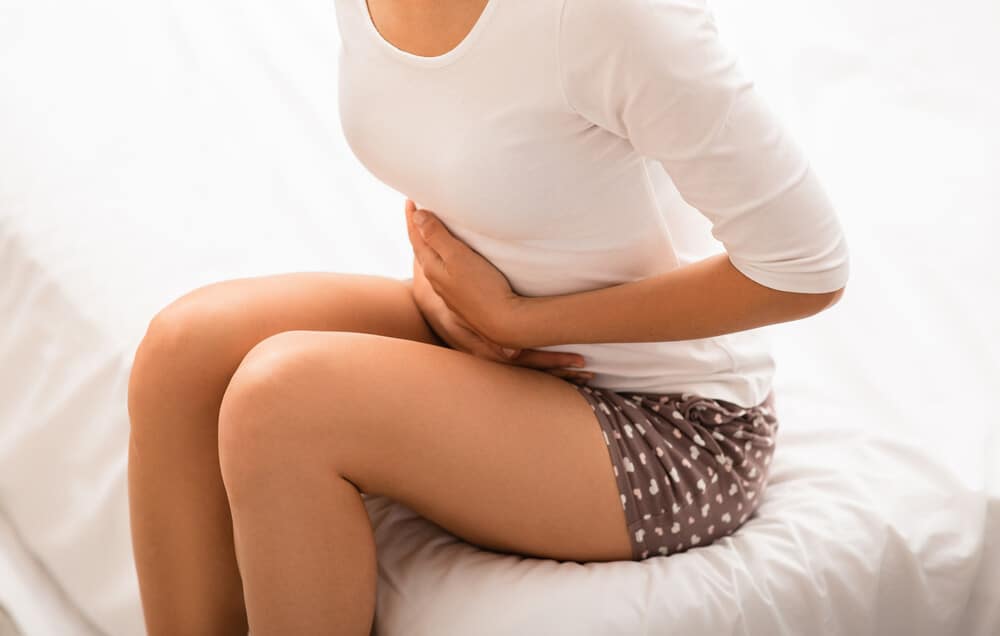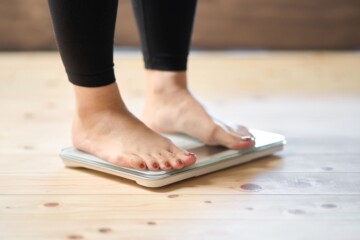We can all agree: bloating is frustrating. If you’re suffering from an uncomfortable tightness around your midsection every month and you struggle to get your jeans to do up, you aren’t alone. Not only does it feel unpleasant, but it may also negatively impact your self-confidence when the bloating causes your stomach to stick out. This swollen-looking tummy can even mimic an early pregnancy bump (which is particularly upsetting if your journey to conceiving is taking longer than you hoped).
Many women can predict when they’ll feel bloated each month like clockwork. This is because ovulation can cause you to feel bloated due to some pretty clever hormone transformations taking place during your menstrual cycle.
What is bloating?
Bloating is an uncomfortable feeling, sometimes sore or painful, where there is abdominal pressure. It may also be accompanied by gas. This all results in the stomach distending. Your skin can feel tight and your stomach can feel like a solid balloon!
It’s easy to mix up bloating and water retention, but they are two separate things. Hormonal bloating is a gassy feeling of increased pressure. Water retention swells the stomach and other areas of the body which makes you feel larger and heavier, but it doesn’t cause gassiness, tummy gurgles or an increase in pressure.
Bloating can have many causes. Some women know that eating certain foods will cause them to bloat, others know that hormones trigger their bloating. The lucky ones get to experience both (sigh).
Is it normal to be bloated during ovulation?
It’s completely normal to experience bloating during ovulation. Ovulation is a time when your body is going through a lot of hormonal changes. Luteinizing hormone (LH) and oestrogen levels surge just before the start of ovulation and these hormones can trigger bloating.
Usually, ovulation bloating will deflate days later. But sometimes the bloating can stay around for longer due to medical issues such as polycystic ovary syndrome (PCOS), endometriosis or an ovarian cyst. In this case, make an appointment with your GP for a checkup to rule these things out.
Around this time in the menstrual cycle, some women also have cravings for comfort food: crisps, chips, takeaways…Although these foods serve to console you, they are all high in sodium which will just aggravate the bloating further.
How can you differentiate between ovulation bloating and premenstrual bloating?
The easy way to differentiate between ovulation bloating and premenstrual bloating is by tracking your monthly cycle.
Premenstrual bloating appears a week before your period, beginning after ovulation. Whereas ovulation bloating appears in the middle of your cycle, usually a couple of days before actual ovulation.
Additional symptoms that you might experience alongside premenstrual bloating could include:
- Mood swings and irritability
- Headaches
- Nausea
- Constipation or diarrhoea
- Abdominal cramping
- Tiredness
- Swollen, tender breasts
How to reduce bloating during or after ovulation?
Thankfully, there are a number of ways in which you can reduce bloating during and after ovulation, let’s take a look.
Exercise
Sluggish digestion can cause bloating during ovulation and enjoying some exercise is just the thing to get it moving as it should to decrease the bloat.
Relaxation
High stress can increase your stomach acid levels, which in turn can increase your chances of ovulation bloating by creating the perfect storm. Schedule time to relax before your monthly ovulation to prevent this: a yoga class, an aromatherapy bath, a massage, an art class or a run — whatever helps you to relax.
Probiotics
Studies show that Lactobacillus acidophilus and Bifidobacterium lactis can help to improve bloating symptoms. Look for a supplement that contains at least one billion CFUs (colony forming units, i.e. viable cells) of these live strains for an optimum result.
Diet
Sometimes bloating can be caused by food intolerances. It’s helpful to limit groups of foods called FODMAPs to see if this helps. FODMAP stands for fermentable oligosaccharides, disaccharides, monosaccharides and polyols — never was an acronym needed more! These foods include artificial sweeteners, wheat and lactose. Also, try to drink lots of water and limit your salt intake to prevent water retention which just adds more swell to the ovulation bloat.
Potassium and magnesium
Eating foods rich in potassium and magnesium like bananas, kale, tomatoes, sweet potatoes, spinach and avocados may help to reduce your ovulation bloating. This is because a lack of potassium and magnesium can cause your body to hold onto excess water and salt.
Bloating shouldn’t restrict day-to-day activities, it’s just annoying and can make you feel self-conscious. Most likely all you need to do is to try adjusting your lifestyle with some of the things we have listed above. However, if you experience bloating which doesn’t go down, then make an appointment with your GP to rule out any other underlying cause.








